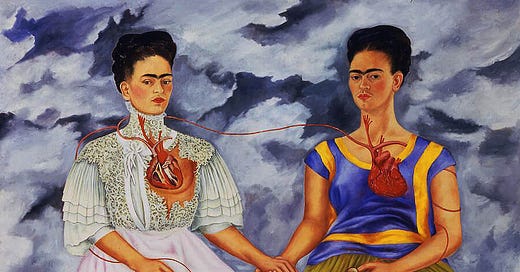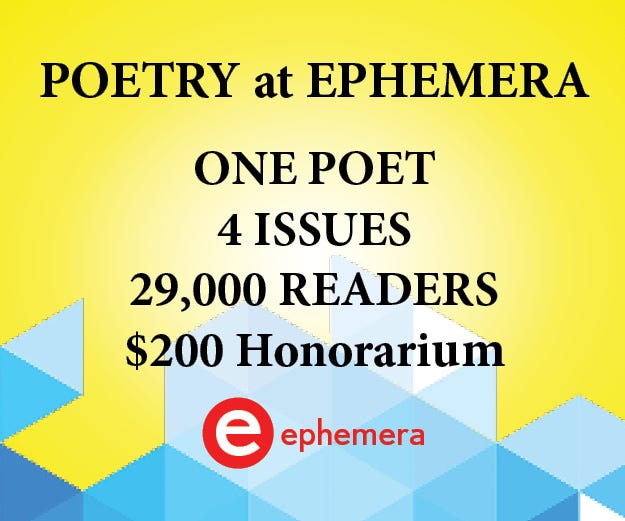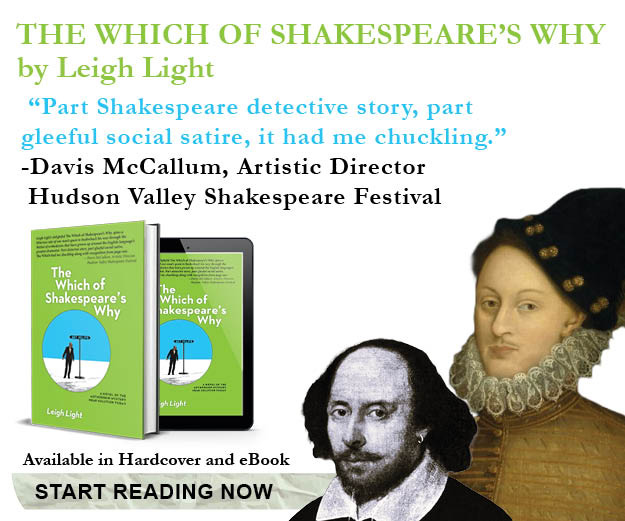Welcome to the Ephemera Newsletter, Padi dɛn! (Krio for “friends”)
We’re celebrating Robert McBrearty, Ephemera’s poet for the month of May! You can review his poems altogether once they publish as well as his artist statement and bio on this dedicated post on our substack page. We thank you for checking out Robert’s work.
On to our standard content matters: Won’t you please check out last week’s issue if you missed it.
And here are some reminders:
Monthly Invite to Submit: Submit for July. Free subscribers and anyone else can submit with the reading fee (up to 10 poems). Paying the reading fee will grant you 1-month paid access to Ephemera’s full letter. Learn more or:
In Brief…this week’s features:
Thoughts on symbolism and the pain of Being as seen in Frida Kahlo’s art.
Listening to Fishmans, a Japanese trip-hop, reggae-influenced, ambient band and their track extensive, trippy, roving and super intriguing track/EP, “Long Season.”
May’s poet, Robert McBrearty and his second of four poems, “Many Ways”
Our weekly lists:
3 magazines with open calls
3 awards/prizes
3 recent job listings for editors and writers.
SPONSOR: From Simon & Schuster publishers, The Which of Shakespeare’s Why, a novel about a playwright who attempts to answer the question of Shakespeare’s true identity while putting on a play of his own under immense pressure from funders and performers alike.
More ephemera:
Last Week’s Issue.
Merci. Danke. Kiitos. 고마워 Go-ma-wo. Cảm ơn. Xiè xiè.
Ephemera
Dear Readers,
It’s mid-month, kinda-sorta mid spring, middling weather, and perhaps we’re having middling thoughts apropos, or, just, brain waves brighten and dull periodically like all the wave-based everythingness around us when you really get to looking beneath things (if you follow physicists too much you’ll start to see the world as they do in small part, in small-small parts, and, well, beware because it’s no wonder they all turn back to god, believe in simulations). Middling thoughts are not an emergency. They can be useful. Perhaps midpoints are good times for reflection and assessment, nadirs and zeniths alike, for we can see where we came from and where we might or must want to go. Reflection and pause. That’s where we are in the moment, in the collection of mid-month moments that fully constitute the breadth of the middle. The middle way might look like writing and notating our recent experiences, scrapbooking travels whether they were local or further afield—pictures, or stubs, or maps, or collectibles, or notes on notes, mini-thoughts, impressions, joys and even the sour minutes. Too, our writing. A reread. Notes on our solid writing or drafts that stay independent, serve as assessments to reference in our middling moments when we can apply the skills of school and sober experience in heightened intensity and proportion over our creative sense.
“Fall in love with yourself, with life, and then with whoever you want.”
—Frida Kahlo, from denverartmuseum.org
Take taking stock seriously. Moments where the pen won’t flow, the keys are sticky or won’t compress, use those for middle-thoughts. Reflect with intention. Plot and plan and note with the same joy and seriousness you apply to your poems directly. Your characters and paragraphs. Loaf in the sun or shade and idle like a pro, as if you really know that by idling you’ll help clear your mind or reorganize it in a way that later—sometimes much later—your creative flow will benefit from the cleanse. From the restructuring. From the imposition of general thinking on the sum of things. Isn’t that what big picturing is? A seepage. A type of ambient filling in such that all disparate little experiences and flourishes and perfectly pitched peaks are brought into a family, an assemblage, a body like bones via cartilage. It occurs to us to issue this reminder, memory is to be taken seriously, as a past time and as a skill, and thus treated with care, honed, exercised, augmented as needed. The work of creatives is serious business. We who elect this path walk amongst giants and greatnesses of spirit. We endeavor nobly. Let’s treat ourselves well with care and concern. Even our transition spaces, our midpoints, our planning and reflections are integral. Take care. Treat middling as key.
Fil fɔ tɛl tɛnki!
(Gratitude)
Poetry by Robert McBrearty
Many Ways. It doesn’t take a virus to kill you. You can die in many ways. In a hotel once a woman fell screaming from the high floors above into the mezzanine and shattered at my feet. Did she fall or did she leap or was she pushed? The hotel staff and even the police seemed incurious to know, and the floor was soon swept so clean I wondered if I had only imagined her fall.
PLEASE REVIEW OUR SPONSOR!
After being sent a copy, we were intrigued and entertained by this book and agreed to promote the work in the newsletter. Anyone who’s ever read a play by Shakespeare and wondered about the pseudonym will be immediately gratified by the introductory and parting notes to the reader that more formally access the who and why of the novel, addressing the politics of Shakespeare’s identity as well as the evidence. In the end—and we’ll let you read it—the author’s conclusion (pen name deployed in apropos fashion) fascinated us. And the novel as well. The notes and novel work together like a Pale Fire—as in they inform each other, though in The Which of Shakespeare’s Why the notes are indeed separate and not a part of the fiction, are meant as non-fiction, essays by the pseudonymous author who apparently serves in academia somewhere. We hope you’ll take a look for yourselves.
From the publisher:
The controversy over who really wrote Shakespeare’s plays has been around almost since they were written. Was the genius behind the plays really that obscure glover’s son from Stratford? Or was it someone else entirely—a man whose class, background, education, and peculiarities make him a more than plausible candidate?
In The Which of Shakespeare’s Why, a 21st-century playwright named Harry Haines makes the case for a major contender via a play he himself is writing for a struggling New Jersey theatre company. Faced with strong disapproval from the “Stratfordites” and with the backing of supporters that sometimes takes some unusual forms, Harry attempts, against great odds, to get the play written and staged.
In the process he has to overcome his own doubts, stay on the right side of the right people, keep his romantic life under control, and deal with not only a difficult actress or two but a flock of opinionated Rockettes. Part hilarious farce, part serious critical examination, The Which of Shakespeare’s Why provides a thought-provoking look at a controversial puzzle with a surprising, ingenious, and wholly satisfying ending that Shakespeare—whoever he was—would have given a standing ovation.
Music: Fishmans
The Japanese band Fishmans is an odd example of how the internet can randomly, all-of-a-sudden-yet-over-time create a buzz around a group. The lead singer, Shinji Sato, died in 1999, a few years after the one track album Long Season released (which is what we’re listening to). Artist deaths can yield cult like followings and fame as likely as it can yield entrenched obscurity. We can never tell. With Fishmans, it wasn’t until after the aughts that they started to become “known” in the west. The internet says it was message boards. Likely, it was
Keep reading with a 7-day free trial
Subscribe to Ephemera to keep reading this post and get 7 days of free access to the full post archives.





